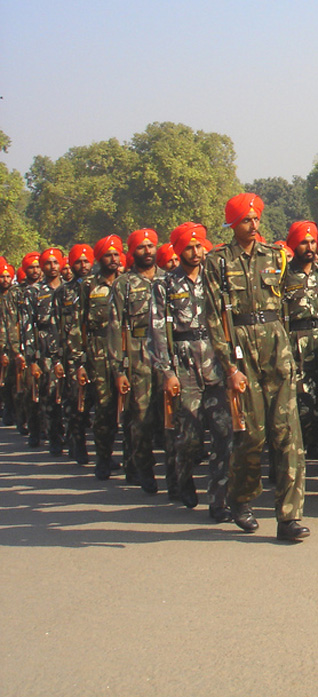Columnists
Courage in Battle:
Its Correlation With Gurbani - Part III
Janam Da Firangee,
Sikhi Mai Mangee
FATEHPAL SINGH TARNEY
I would like to do two things in this particular column. First, continue my efforts to connect Sikh courage on the battlefield with Gurbani, and second, to convey some very personal experiences in anecdotal form.
I have always enjoyed the writings of the late Sardar Khushwant Singh and his work has always influenced my own. His joke books, for example, are filled with anecdotal material and it is said that imitation is the highest form of flattery. Therefore, I'll begin with the latter topic of personal experiences.
My late father was an accomplished violinist and was very fastidious regarding his appearance. I know that were he a Sikh, he would have taken to the stringed musical instruments of India, such as the sarangi and dilruba like a duck takes to water. Moreover, I am confident that he would have tied an impeccable dastaar. He was the type of authoritarian parent that, as a Sardar, would never have permitted me to leave the house with uneven lars!
Khushwant Singh's novella, ‘Train to Pakistan‘, is another work of his that has inspired me through the years. A novella may be defined either as a short novel or a long short story. ‘Train to Pakistan’ intertwines the tragic 1947 Partition of Punjab with the enduring love between a Sikh lad and a Muslim girl.
I first read this novella long before I became a Sikh. This read was one of the things that stimulated my interest in the subcontinent in general and Sikhi in specific.
Another novella that exerted a tremendous influence on me was ‘Goodbye Mr. Chips’ by James Hilton. This is the story of an English schoolteacher. I confess that this fictional teacher was always a role model for me and I taught school for over 40 years. It may be apocryphal, but it has been said that the author, James Hilton, wrote ‘Goodbye Mr. Chips’ in a weekend, having been inspired by a teacher of his. As in the case of ‘Train to Pakistan‘, it became a best-selling book and subsequently made into several movies.
Before I leave this life, I want to write a novella, which is far more realistic project for me than a magnum opus like Tolstoy’s ‘War and Peace‘!
I think it is part of human nature to want to be accepted and belong to some group or community beyond one’s self and one’s immediate family. I confess to trying to get involved in Punjabi conversations when, in fact, I am not entirely sure of what is being said. I have interjected a “Ttheek hai,” a “Haan ji,” and a “Chunga,” in conversations when my comprehension was far less than 100%!
I admit that there have been times when these linguistic deceptions have gotten me in trouble.
Another counter-intuitive experience I have had is the times I have met Indians who assume that I am from Punjab. Punjabi Sikhs usually think, quite rightly, that I am a Western Sikh, but I met a Hindu from Gujarat, a Christian from Kerala, and a Hindu from Tamil Nadu, all of who thought I was from Punjab. In other words, it seems that the further away from Punjab an Indian person is from, the more Punjabi I appear to be!
A number of writers have compared the battles at Thermopylae in ancient Greece and Saragarhi in British India. The similarities are striking: a small force in hopeless combat resisting a much larger enemy. Would that more people in the West became familiar with Saragarhi.
In 480 B.C.E., at Thermopylae, in northern Greece, 300 Spartans delayed the advance of a huge Persian army and all died fighting. In 1897 I.C.E., at Saragarhi, 21 Sikhs fought to the death against a much larger force of Pathans.
Synchronicity is a theory developed by the Swiss psychiatrist Carl Jung. It argues that certain events are coincidences filled with meaning. They occur despite no causal connection between them.
C.P. Cavafy was a Greek poet born in the late 19th century. He wrote very concise poems that revived Greek poetry for the modern world. His poetic themes were based on personal experience and his vast knowledge of history. One of his greatest poems was about the battle at Thermopylae, but Cavafy makes a strong case that we all face “Thermopylaes” in life.
As a Sikh, I would agree but add the word “Saragarhis” to his thesis. Moreover, Cavafy’s poem describes the kind of integrity and compassion that fills our Guru Granth Sahib. I urge my readers to merely substitute the word Saragarhi for Thermopylae and they’ll appreciate, as I do, that we are not talking only about battlefield valor, but about struggles we all have – small and large.
Here’s the poem:
* * * * *
THERMOPYLAE
by C.P. Cavafy
Honor to those who in the life they lead
define and guard a Thermopylae.
Never betraying what is right,
consistent and just in all they do
but showing pity also, and compassion;
generous when they are rich,
and when they are poor,
still generous in small ways,
still helping as much as they can;
always speaking the truth,
yet without hating those who lie.
And even more honor is due to them
when they foresee (as many do foresee)
that in the end Ephialtis* will make his appearance,
that the Medes** will break through after all.
* Ephialtis – the Greek traitor who led the Persians to a secret mountain pass enabling them to attack the Spartans from behind.
** Medes – another term for the Persians
And then there is the great line from ‘Julius Caesar’:
A coward dies a thousand times before his death, but the valiant taste of death but once. [Shakespeare, Julius Caesar, II:2]
October 18, 2016



